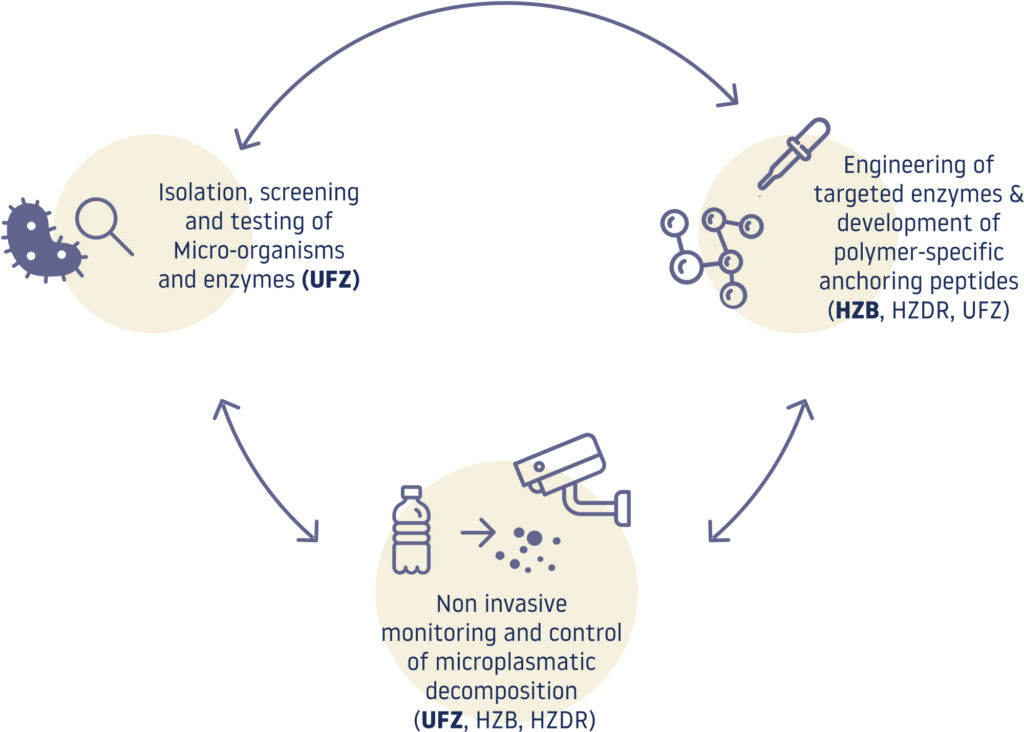Dr. Dietmar Schlosser
d.schlosser@ufz.de
Tel.: +49 (0) 351 260-4413
UFZ

To achieve the goals of the FINEST MICROPLASTICS sub-project, microorganisms (bacteria, fungi) and microbial enzymes capable of acting on the different kinds of relevant plastics and plasticizers are explored and characterized. Promising enzymes are improved with regards to efficiency and stability in order to meet requirements of real application processes, and the resulting biocatalysts are made available to practitioners for process development. Concomitantly, novel tools holding promise for an improved accessibility of microplastics for decomposing enzymes and the specific separation of different types of plastics models describing the polymer decomposition and using the predictive power of bio-thermodynamics as well as biocalorimetry-based thermal sensors for the non-invasive activity monitoring of processes are developed. These tools also possess general potential applicability beyond the scope of this specific research. Due to the absence of facile and rapid assays, micro- and nanoplastics do not fall under any environmental or food monitoring routines. Polymer type-specific peptide binders will pave the way for a micro- and nanoplastics detection assay through fluorescent protein tethering peptide fusion proteins coupled to flow cytometry.
The biocatalysts to be developed within FINEST MICROPLASTICS are intended to enable the conversion of synthetic polymer (plastics) fractions of fine-grained residues and accompanying pollutants/additives to yield (i) specific mono- and oligomers as building blocks for new product synthesis, (ii) microbial biomass amenable to further microbial fermentation processes (e.g. for bioenergy purposes), and (iii) inert and safe residues for deposition. They will be made available to practitioners for implementation in industrial platform organisms and pilot-scale applications.
Team
Simone Bertoldi (UFZ)
PhD Candidate
Stefanie Clauß (UFZ)
PhD Candidate
Mail: stefanie.clauss@ufz.de
Dr. Christian Eberlein
Postdoc
Noelia Fernandez Merayo (UFZ)
PhD Candidate
Sonja Harter (HZDR)
PhD Candidate
Mail: s.harter@hzdr.de
Dr. Hermann Heipieper
Principal Investigator
Dr. Da'san Jaradat (HZB)
Postdoc
Mail: jaradatdasan@gmail.com
Dr. Franziska Lederer (HZDR)
Principal Investigator
Prof. Dr. Thomas Maskow (UFZ)
Principal Investigator
Dr. Katrin Pollmann (HZDR)
Principal Investigator
Dr. Dietmar Schlosser (UFZ)
Principal Investigator
Parinita Singh (HZDR)
PhD Candidate
Dr. Gert Weber (HZB)
Principal Investigator
Dr. Ren Wei
Principal Investigator
University of Greifswald
Institute for Biochemistry
Associated Partner University of Greifswald
Junior Research Group Leader “Plastic Biodegradation”
Felix-Hausdorff-Straße 8 (Raum 0.56)
17489 Greifswald, Germany
Mail: ren.wei@uni-greifswald.de
Tel.: +49 3834 420 4455


